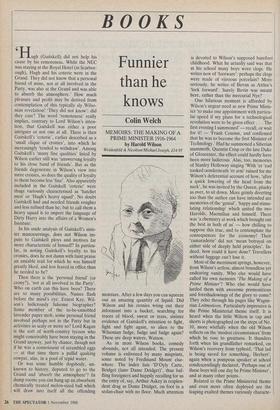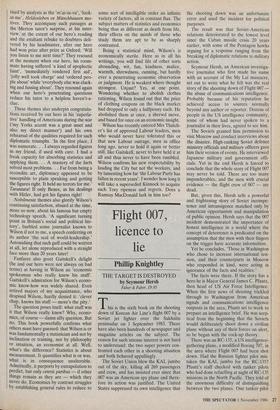BOOKS
Funnier than he knows
Colin Welch
MEMOIRS: THE MAKING OF A PRIME MINISTER 1916-1964 by Harold Wilson
Weidenfeld & NicolsonlMichael Joseph, £14.95
Hugh (Gaitskell) did not help his cause by his remoteness. While the NEC was staying at the Royal Hotel (at Scarbor- ough), Hugh and his coterie were in the Grand. They did not know that a personal friend of mine, not at all involved in the Party, was also at the Grand and was able to absorb the atmosphere.' How much pleasure and profit may be derived from contemplation of this typically sly Wilso- nian revelation! 'They did not know': did they care? The word 'remoteness' really implies, contrary to Lord Wilson's inten- tion, that Gaitskell was either a poor intriguer or not one at all. There is then Gaitskell's 'coterie', earlier described as a `small clique of cronies', into which he increasingly 'tended to withdraw'. Among Gaitskell's 'many fine qualities' listed by Wilson earlier still was 'unswerving loyalty to his close band of friends'. But as the friends degenerate in Wilson's view into mere cronies, so does the quality of loyalty to them become less 'fine'. Also apparently included in the Gaitskell 'coterie' were thugs variously characterised as 'hatchet men' or 'Hugh's heavy squad'. No doubt Gaitskell had and needed friends rougher and less refined than he; but to call them a heavy squad is to import the language of Dirty Harry into the affairs of a Women's Institute.
In his snide analysis of Gaitskell's sinis- ter manoeuvrings, does not Wilson im- pute to Gaitskell ploys and motives far more characteristic of himself? In particu- lar, in noting Gaitskell's loyalty to his cronies, does he not damn with faint praise an amiable trait for which he was himself greatly liked, and less feared in office than he needed to be?
Then there is the 'personal friend' (or crony?), 'not at all involved in the Party'. Who on earth can this have been? There are so many possibilities. Names flash before the mind's eye: Ernest Kay, Wil- son's ludicrously fulsome biographer? Some member of the to-be-ennobled lavender paper mob, some personal friend involved perhaps not in the Party but in activities as scaly or more so? Lord Kagan is the sort of north-country tycoon who might conceivably have been staying in the Grand anyway, just by chance, though not if he was a connoisseur of scrambled eggs — at that time there a pallid quaking cowpat, alas, in a pool of tepid water.
Or was some humble dogsbody, un- known to history, deputed to go to the Grand and 'absorb the atmosphere'? In damp rooms you can hang up an absorbent chemically treated melon-sized ball which will draw into itself all the offending moisture. After a few days you can squeeze out an amazing quantity of liquid. Did Wilson and his cronies wring out their informant into a bucket, searching for traces of blood, sweat or tears, sinister evidence of Gaitskell's intention to fight, fight and fight again, so alien to the Wilsonian fudge, fudge and fudge again? These are deep waters, Watson.
As in most Wilson books, comedy abounds, not all intended. The present volume is enlivened by many misprints, some noted by Ferdinand Mount else- where. The index lists 'D'Oyly Carte, Bridget (later Dame Dridget)', thus baf- fling foreigners and happily recalling for us the entry of, say, Arthur Askey in resplen- dent drag as Dame Dridget, on foot in a sedan-chair with no floor. Much attention is devoted to Wilson's supposed barefoot childhood. What he actually said was that at his school many boys wore clogs. He writes now of lootware': perhaps the clogs were made of vitreous porcelain? More seriously, he writes of Bevan as Attlee's `lock forward'. Surely Bevin was meant here, rather than the mercurial Nye?
One hilarious moment is afforded by Wilson's urgent need as new Prime Minis- ter `to make one appointment with particu- lar speed if my plans for a technological revolution were to be given effect . . . The first evening I summoned' — recall, or wait for it! — 'Frank Cousins, and confirmed that he was to become the first Minister of Technology.' Had he summoned a Siberian mammoth, Quentin Crisp or the late Duke of Gloucester, the effect could hardly have been more ludicrous. Alas, too, memories of Stanley Holloway singing 'With 'er 'ead tooked oonderneath 'er arm' ruined for me Wilson's deferential account of how, 'after a quick lowering of the head from the neck', he was invited by the Queen, plucky as over, to sit down. More grimly diverting too than the author can have intended are memories of the 'genial', 'happy and stimu- lating relationship' which united the two Harolds, Macmillan and himself. There was 'a chemistry at work which brought out the best in both of us' — how chilling to suppose this true, and to contemplate the consequences for the economy! Their `camaraderie' did not 'mean betrayal on either side of deeply held principles'. In- deed, how could it have done? Travellers without luggage can't lose it.
Most of the merriment springs, however, from Wilson's artless, almost boundless yet endearing vanity. Who else would have called his own memoirs 'The Making of a Prime Minister'? Who else would have larded them with awesome premonitions and foreshadowings of the glory to come? They echo through his pages like Wagne- rian Leitmotiven. Particularly impressive is the Prime Ministerial theme itself. It is heard when the little Wilson in cap and shorts is photographed on the steps of No. 10, more wistfully .when the old Wilson reflects on the 'modest circumstances' from which he rose to greatness. It thunders forth when his grandfather remarked, on Wilson's recovery from typhoid, 'That lad is being saved for something, Herbert'; again when a pompous speaker at school condescendingly declared, 'Perhaps one of these boys will one day be Prime Minister', and at many other points.
Related to the Prime Ministerial theme and even more often deployed are the leaping exalted themes variously characte- rised by analysts as the `In'as-to-vu', 'look- at-me', Heldenleben or Munchhausen mo- tives. They accompany such passages as the 'Merton tutor's surprise, at his inter- view,` These themes also underpin congratula- tions received by our hero in his 'superla- tive' handling of Americans during the war (`my Yorks accent was a great asset and also my direct manner') and his own rehearsal of the qualities required for such diplomatic triumphs. 'In the first place, I was numerate. . . I always regarded figures as my friend, if used with care. I had a freak capacity for absorbing statistics and applying them. . . A mastery of the facts solved most problems. . . Far from being a recondite art, diplomacy appeared to be susceptible to plain speaking and getting the figures right. It held no terrors for me.' Tarantara! If only Benes, in his dealings with Hitler, had got his figures right! Nobilmente themes also glorify Wilson's continuing satisfaction, absurd at the time, more so now, about his famous but empty technology speech. 'A significant turning point in Britain's social and political his- tory', burbled some journalist known to Wilson if not to me, a speech conferring on its author 'the seal of world-leadership.' Astonishing that such guff could be written at all, let alone reproduced with a straight face more than 20 years later! Fanfares also greet Gaitskell's delight (he and our hero were not always on bad terms) at having in Wilson an 'economic spokesman who really knew his stuff. Gaitskell's admiration for Wilson's econo- mic know-how was widely shared. Even retired majors of my acquaintance, who despised Wilson, hardly denied it: 'clever chap, knows his stuff — more's the pity.' The question poses itself: what stuff was It that Wilson really knew? Why, econo- mics, of course — damn silly question. But no. This book powerfully confirms what others must have guessed: that Wilson is or was fundamentally a statistician and not by inclination or training, nor by philosophy or intuition, an economist at all. Well, what's the difference? Statistics is about measurement. It quantifies what is or was, what is in consequence unalterable. Admittedly, it purports by extrapolation to predict, but only ceteris paribus — if other things remain as they are — which they never do. Economics by contrast struggles by establishing general rules to reduce to some sort of intelligible order an infinite variety of factors, all in constant flux. The subject matters of statistics and economics being thus as different as death from life, their effects on the minds of those who study them are apt to be as sharply contrasted. Being a statistical mind, Wilson's is economically sterile. Here as in all his writings, you will find life of other sorts abounding, wit, fun, kindness, malice, warmth, shrewdness, cunning, but hardly ever a penetrating economic observation or judgment. He is weakest where thought strongest. Unjust? Yes, at one point. Wondering whether to abolish clothes rationing, Wilson found out that the price of clothing coupons on the black market had dropped to only a halfpenny each. He abolished them at once, a shrewd move, and based for once on an economic insight. Wilson has recently entered Mrs Thatch- er's list of approved Labour leaders, men who would never have tolerated this or that new Labour outrage, men in office long ago, never to hold it again or better still, like Gaitskell, never to have held it at all and thus never to have been rumbled. Wilson confirms his new respectability by lauding the City but not the workers, and by lamenting how far 'the Labour Party has fallen in recent years'. I wonder how long it will take a superseded Kinnock to acquire such Tory ripeness and regrets. Does a Ramsay MacDonald lurk in him too?



















































 Previous page
Previous page